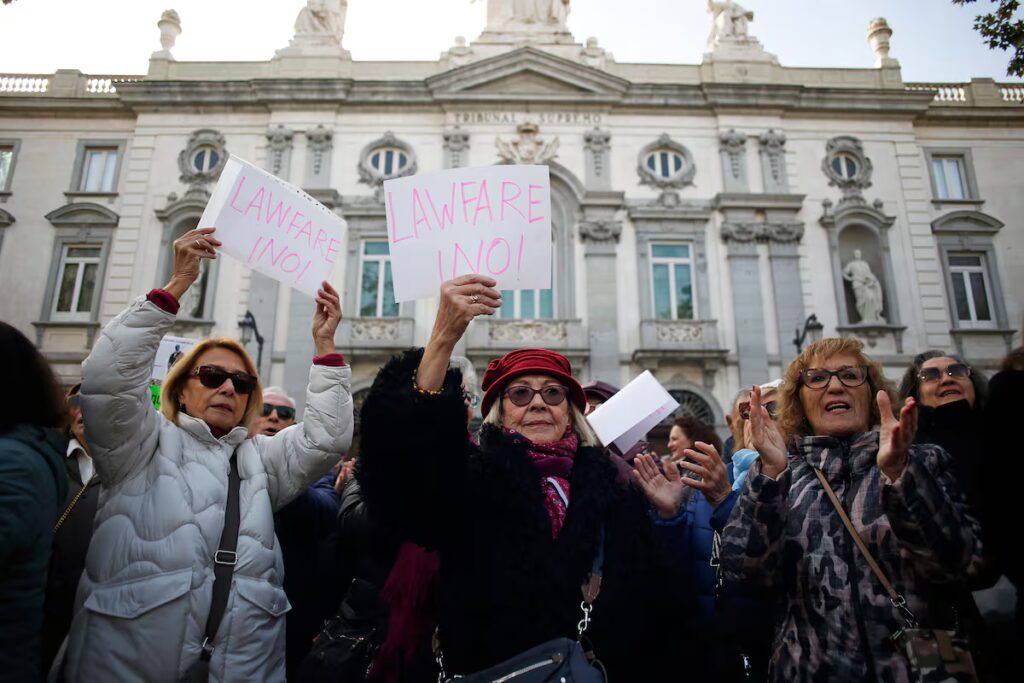
We have known the pronouncement of a sentence that will mark an era through a procedure that is as unusual as it is disturbing: the parties became aware of it with a simple sentence at the same time as the public opinion became aware of it through a press release. All this without a written legal basis yet existing. Those of us who defend the public know that order matters. A sentence is not a slogan: it is a logical process that starts from proven facts, continues with a justified legal justification and ends with a sentence. Reversing that order – first the sentence and then the explanation – gives citizens the feeling that the outcome has been decided in advance and that everything else will be built after the fact. This perception, in a democracy, is devastating.
In this case there are too many open questions. The justification must clarify why this specific leak deserved such an extraordinary spectacle, when there are hundreds of them every year without criminal consequences. Also because the investigation focused on just one person among dozens – or even hundreds – with access to email, and because the testimonies of those who regularly receive leaks were discarded while others clearly interested in the political outcome of the trial were strengthened. Perhaps it is necessary to explain why an information note from the Prosecutor’s Office, initially considered not reprehensible, was interpreted as criminal and, if so, why it was not notified from the beginning. And above all because such exceptional measures were necessary – searches of offices containing particularly sensitive information and the total intervention of communications by a high authority – to essentially end up discussing the contents of a note intended to deny a very serious and false accusation. The disproportion between the object of the proceedings and the means used requires a clear explanation.
All of this happens, moreover, in a context in which what is being investigated by justice is not a fiscal anecdote, but rather an economic framework involving millionaire commissions, public health contracts of enormous importance and direct links with those who exercise decisive political power in the Community of Madrid. That is to say: an issue that affects the general interest and that requires strong institutions, not intimidating institutions.
In this scenario, what is at stake goes far beyond the proper name. What is clarified is the right of citizens to know the truth and the right that justice does not respond to insinuations, pressures or political scripts. This right to the truth is intertwined with another democratic pillar: the right to the presumption of innocence. And both must walk together, because a country that allows the truth to be manipulated ends up allowing it to be judged without guarantees.
The rules of a fair trial are based on a fundamental premise: each defendant must clearly know the concrete fact for which he or she is held responsible, whether it is the leaking of an email or the drafting of an information note. Without this precise delineation from the beginning, there is no possible defense or true equality in the process. And when there is no direct evidence, the need is greater: evidence can support a belief only if it is supported by fully accredited facts and the inferences made from it are coherent, reasonable and non-arbitrary. If there is a minimally plausible alternative explanation, doubt must prevail. It is not a question of codes or technicalities: it is an elementary democratic request. No one can be found guilty as long as the truth remains questionable.
We are not faced with a technical debate reserved for jurists, but with the democratic guarantee that protects any citizen from possible convictions based on assumptions, hypotheses or subjective perceptions, even if they come from those who hold high institutional responsibilities. Justice can only operate with a clear accusation – no surprises as to what specific act is charged – and with good evidence, direct or circumstantial, that conclusively demonstrates who did what. Without this demonstration the sentence becomes arbitrary, the opposite of the social and democratic rule of law.
And even more so when everything takes place in a climate of enormous political tension: if the law is not applied with extreme rigor, citizens can interpret that the sentence responds to biased logic and not to the impartiality of the application of the law. This perception would be devastating for democracy, because a judiciary seen as a political actor – and not as a neutral guarantor of the rules – is no longer a pillar of the system. Even more so if it were an information note from the Prosecutor’s Office which would not have revealed anything that the editorial staff of the country’s main media outlets did not already know.
That’s why this case matters, beyond the specific figure involved. It is important because it measures the strength of our institutions, the quality of public debate and the ability of our justice system to act without fear and favour. It is important because it shows whether we remain a country where the truth is defended and where innocence is not overwhelmed by suspicion. It matters because, when those who investigate the powerful end up being unmasked, accused or weakened, the message citizens receive is that some investigations are free and others are very expensive. And that message is incompatible with a democracy worthy of the name.
Democracy is supported by proven facts, not stories; with tests, not with pressure; with clear motivations, not with anticipated failures. If justice wants to be justice – and not just another tool of political combat – it must guarantee it. Because when the law recedes no one advances: the whole country loses.
Democracy does not protect itself. You protect yourself by enforcing the law, not bending it.





